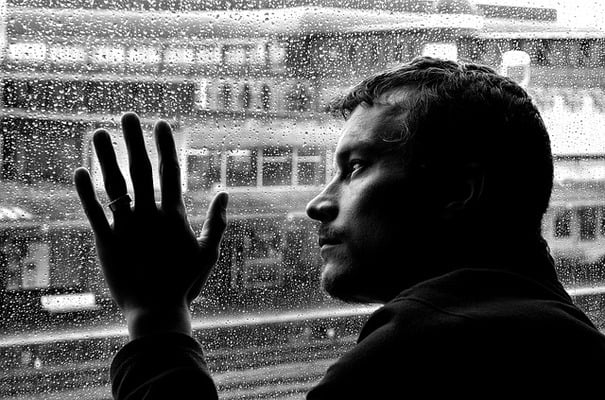- Get Therapy
- Guides & Videos
-

In 2019, people say "I'm depressed" to describe how they feel about a lot of things. Having to go back to work on Monday or hearing about the cancellation of a favorite television show can get tagged as #depressing. We know that using the word this way isn't clinically accurate, but what is depression, exactly? When is sadness just a passing mood and when is it something more?
When you're intensely sad or sad for a long time, you might start to wonder if you're not just sad, but depressed. Knowing the difference matters, because depression isn't just a #mood—it's a serious mental health condition that can affect your long-term emotional and physical health. While most people can overcome sadness with a little help from their friends, depression can linger without professional treatment and can lead to serious complications.
Some painful situations can make us feel intensely sad. Disappointment and loss are something we all have to deal with, but their universality doesn't lessen their sting. When a beloved person or animal dies, a long-term relationship ends, or you lose a job or an opportunity you worked long and hard to achieve, it can leave an ache that only time and tears can wash away.
The raw pain of sadness can often be felt in the body—usually in or near the stomach or heart. The physical ache can be a constant reminder of what you've lost and can make it hard to focus on normal tasks. Sorrow can follow you to the strangest places and trigger unexpected tears. Sadness isn't always intense, but when it is, it stops you in your tracks. Fortunately, the intensity usually comes and goes in waves until the sadness finally abates.
Depression is intense by default. It doesn't rise and fall over the course of the day like sadness does. Sadness can mix with other emotions to create a bittersweet, nostalgic, or yearning mood, while a depressed mood is all-encompassing and monolithic. Where sadness touches your life, depression covers and consumes it, making it hard to feel any other emotion. Sadness sears your heart, but depression slowly and relentlessly transforms your inner world into a desert.
When you're sad, you're nearly always sad about something, but depression isn't always tied to a specific cause. People who are sad think a lot about what is making them sad, but people who are depressed pass everything through a filter of despair. Where a sad person might think, "I wish my friend was here to share this with me," a depressed person might think, "There's no point in being here right now," or even, "There's no point in doing anything." While sadness colors your thoughts, depression takes them over.
A depressed mood isn't always a sad one. Many people who struggle with depression feel more emotionally numb or depleted than sad. Sometimes, people who are depressed experience a progression of mood from sad to blank or empty. Someone who is depressed might spend many days and nights feeling tearful, until they feel so emotionally drained that there's not enough emotional energy to feel sad any more.
Depression can make everything in life feel the same. One of the characteristic symptoms of depression is anhedonia, an inability to feel pleasure or be moved by experiences that normally have an emotional impact. This can feel bleak and dark but can also provoke a detached emotional state called ennui. When you're depressed, you can sink into a place where pain and pleasure lose their meaning, making it hard to find motivation to do things that would normally help you feel better.
Anger is another common symptom of depression. If you feel emotionally depleted and drained, you can get to a point where you feel overwhelmed and start lashing out whenever you feel pushed—which is most of the time when you're depressed. Sometimes, depressed people fixate on angry thoughts about a particular issue, while others feel prickly and irritable in general, erupting in angry outbursts over what would otherwise be minor frustrations.
When you're sad, your mood paints your world in shades of blue. It weaves its way into your normal daily activities and renders many of them in its characteristic hue. Your heart is strangely touched by this changed world and you feel more tender than usual. Eventually, the sadness runs its course, whether it persists for a few hours or for a few days. When it's gone, the blues fade and the other colors return, as bright as they ever were.
Depression pulls the color out of everything and can dim your world for a long time. By definition, a major depressive episode persists for at least two weeks and can last for months or even a year or more. Even if it was triggered by something specific, depression chews its way into every area in your life until it can be hard to remember where it came from or even what it was like not to be depressed.
The effects of depression extend beyond just mood. To be diagnosed with a major depressive episode, you must experience five or more of the following symptoms during the same two-week period:
For a diagnosis of major depressive disorder, one of the five symptoms must either be depressed mood or anhedonia (loss of interest or pleasure in normal activities). However, any combination of the above symptoms points toward depression, whether to another type of depression or to the beginning of a major depressive episode that hasn't yet reached full force.
The earliest symptoms of depression are often physical. Sleep disruption or shifts in your energy level can herald an oncoming depressive episode, and these symptoms frequently worsen as the episode intensifies. Major depression causes bone-deep fatigue that makes everything harder to do. Think of times you've been sick or haven't slept well and have barely had the energy to get out of bed, and then imagine that was how you felt day after day—that's depression.
When depression is severe, even daily self-care tasks like taking a shower can be difficult to get through. The frustrating cycle of depression is that the energy it takes to conquer seemingly trivial tasks can drain you to the point you need time to recover from them. The energy just isn't there. People who haven't been depressed often have a hard time understanding this, which can make depression feel even more isolating than it already does.
When a well-meaning person asks you why you don't simply do something you normally enjoy, it can reinforce the hopelessness you already feel. When you're depressed, you often feel guilty because you still think of yourself in terms of who you were before you were depressed. Why can't you simply get it together? Even when you know and have some insight into depression, it can be hard to remember that your struggles don't reflect a moral failing any more than low energy is your fault when you have a medical condition.
Depression makes life an uphill battle. You finally have a day where you have a little more energy, so you try to do something to improve your mood, only for your efforts to fail or to leave you drained for days. Experiencing this repeatedly can make your thoughts turn dark. Because of the hopelessness this cycle can cause, depression increases the risk of self-harm and suicide, but people can and do recover. One of the best ways to overcome depression is to break the cycle of despairing thoughts, and the best way to do that is by going to therapy.
When you're sad, it's usually enough to talk to a loved one or vent to friends or family, but when you're depressed, people who love you can have a hard time understanding or knowing how to support you. Their efforts can leave you feeling worse even when they mean well, which can alienate you from one another and make you feel even more hopeless.
Depression takes over your thinking in a way a therapist can help you untangle. A good therapist won't try to shut you down or make you feel judged for sharing your darker thoughts with them. Not only will therapy give you a safe space to vent, it will also help you gain insight into the thoughts and patterns of behavior that fuel your depression and keep it going. The key to healing from depression is to stop believing the thoughts that nothing will ever get better and to see how change is possible with the right help. With support and insight, you can flip the downward spiral of depression into the upward spiral of recovery.
A good therapist can help you whether you're depressed or sad. While it's essential to get the right help when you're depressed, you don't have to be depressed to benefit from therapy. When you get lost in sad thoughts or have trouble changing harmful habits or patterns, a therapist can help you get unstuck. If you're depressed or are worried that you might be, or if you're simply sad in a way you want help to overcome, consider starting or going back to therapy. You can use the search tools on OpenCounseling to find free or low-cost therapy where you live, or you can try affordable online therapy through BetterHelp (a sponsor). Don't give in to your depressed thoughts—you can get help, and you can get better.


